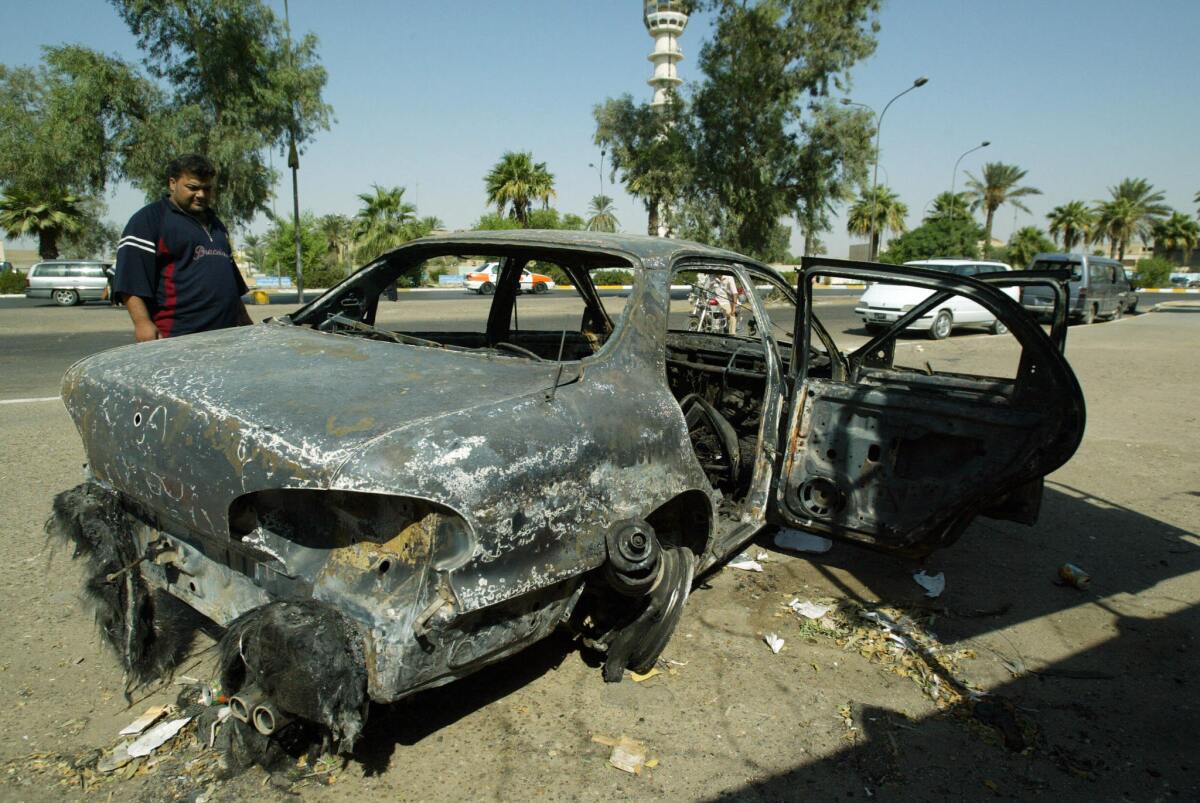Blackwater convictions leave several Iraqi victims wanting more

- Share via
Reporting from Baghdad — After he attended the federal trial in the United States this summer for four Blackwater security contractors accused in 2007 shootings that left 17 Iraqis dead, Sami Hawas Hamoud was eager to keep up with events in the case.
But back home in Baghdad, Hamoud found that the incident had been all but forgotten. Though the shootings there had outraged Iraqis and was the talk of the capital seven years ago, there was virtually no mention of the trial in the local news media.
Hamoud, who was badly wounded by gunfire that also killed his mother, didn’t find out that a verdict had come down on Wednesday until he got a call from an American reporter the next day. Only then did he learn that the four former contractors had been convicted of several crimes.
Former contractor Nicholas Slatten, 30, convicted Wednesday of murder, faces possible life in prison. Three former contractors convicted of manslaughter and firearm charges – Paul Slough, 35, Dustin Heard, 33, and Evan Liberty, 32 -- face mandatory 30-year minimum prison sentences.
“It’s not enough,” Hamoud said. “I would prefer that they were executed.”
Hamoud said he is still angry and bitter seven years after his back and leg were shredded by bullet wounds. The contractors, who later said their armored convoy had been ambushed by insurgents, opened fire in crowded Nisoor Square on Sept. 16, 2007, with automatic weapons, sniper rifles and grenade launchers.
Hamoud said he is disabled and unable to continue his previous job as a taxi driver. But the rest of Iraq seems to have moved on, consumed by the terrifying onslaught in the north and west of the country by Islamic State militants, and by car bombs blamed on Islamic State that often explode several times a day in Shiite Muslim neighborhoods.
The Nisoor Square shootings were just one horrifying incident among countless other tragedies that have befallen Iraq since U.S. troops toppled the regime of Saddam Hussein in 2003. But for survivors like Hamoud and relatives of those killed, the incident is a grievous wound that hasn’t healed.
“I’m not satisfied,” Ali Abbas, a heavy equipment operator whose brother and nephew died in the attack, said after learning of the verdict Thursday from an American reporter. “This trial was just a big show. It was theater.”
Abbas, 53, who said he flew to Washington and testified at the trial, said his brother and nephew were killed without cause as they were searching for an apartment to rent. He never believed he would find true justice in an American court, he said, and he does not believe that justice was fully served.
“I don’t have faith in them,” Abbas said of the American courts.
He said he believed more than four gunmen were involved in the shootings, which wounded at least 17 people. And the jury did not hear from enough witnesses, he maintained. At least 75 witnesses testified at the trial, including 30 from Iraq. The jury in Washington deliberated for 28 days before reaching the verdicts.
Abbas said his family received $200,000 -- $100,000 for each death -- from Blackwater, which has been sold and renamed and is now called Academi. Hamoud said he received $100,000 for his mother’s death and $30,000 for his wounds. The payments were part of a 2010 settlement of civil suits against Blackwater.
The payments may seem large by Iraqi standards. But the money has to support his family for the rest of his life and beyond, Hamoud said.
Hamoud said that though he flew to the United States for the trial he was rejected as a witness. His son, Izaldeen, 21, testified instead on behalf of the family. The two had been taking Hamoud’s mother to a hospital for an appointment the day of the shooting.
“It still feels like some kind of conspiracy,” he said of the trial. “It’s like a theater play that goes on too long.”
Hamoud said he was frustrated that he couldn’t find useful information about the trial on Iraqi TV and radio or in newspapers. There has been very little discussion about the case on social media, which is focused instead on Islamic State and Baghdad’s deteriorating security.
Even though Iraq seems to have lost interest in the case, Hamoud said he was instructed by government prosecutors not to discuss it with the news media.
“Nobody’s talking about it in Baghdad anyway,” he said. “It happened a long time ago.”
Follow @davidzucchino on Twitter for news out of Iraq
More to Read
Sign up for Essential California
The most important California stories and recommendations in your inbox every morning.
You may occasionally receive promotional content from the Los Angeles Times.











